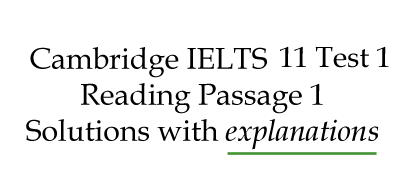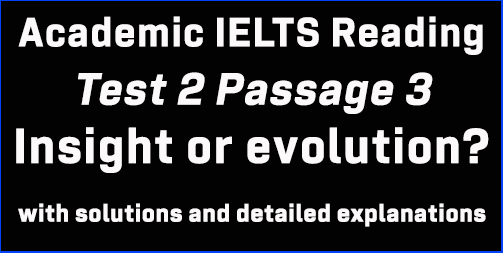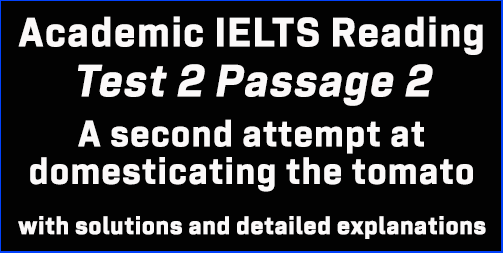IELTS Reading: Cambridge 11 Test 1 Reading Passage 1; Crop-growing skyscrapers; best solutions with explanations
In this post, a set of IELTS Reading test questions and answers are discussed with detailed explanations. I am discussing Cambridge IELTS 11 Test 1 Reading Passage 1 here. The primary focus is to make students comfortable in finding IELTS Reading Test easily.

So, let’s begin.
Questions 1-7: Completing sentences by filling in the gaps (NO MORE THAN TWO WORDS)
Indoor Farming
- Some food plants, including _______, are already grown indoors.
The key phrase for the answer is: already grown indoors
The answer is found in the first sentence of Paragraph 2 where the author states, “The concept of indoor farming is not new, since hothouse production of tomatoes and other produce has been in vogue for some time”.
The example of only tomatoes clarifies the answer to the question. In the question, the word including is synonymous to for example.
More clues: in vogue for some time = already, hothouse production= grown indoors
Answer: tomatoes
- Vertical farms would be located in _________, meaning that there would be less need to take them long distances to customers.
Key words / phrases for the answer are: vertical farm, located, distances
The answer is found in line 15 of Paragraph 2 where the author says, “Situated in the heart of urban centres, they (vertical farms) would drastically reduce the amount of transportation required to bring food to customers”.
More clues: situated= located, transportation= distance, drastically reduce= would be less
Answer: urban centers / centres
- Vertical farms could use methane from plants and animals to produce ________.
Key words for the answer are methane, produce
The answer is found in paragraph 4 where the word methane is mentioned. Therefore, we should focus on it. Here, line 15 says, “Although the system would consume energy, it would return energy to the grid via methane generation from composting non-edible parts of plants”.
More clues: return = produced as a result
Answer: energy
- The consumption of ______ would be cut because agricultural vehicles would be unnecessary.
Key words for this answer are consumption, cut, vehicles
The answer is found in lines 19, 20, 21 of Paragraph 4 where the writer states, “It would also dramatically reduce fossil fuel use, by cutting out the need for tractors, ploughs and shipping.”
More clues: use = consumption, reduce = cut, tractors = vehicles
Answer: fossil fuels
- The fact that vertical farms would need ______ light is a disadvantage.
Key words for the answer are need, light, and disadvantage
The answer is found in the opening of Paragraph 5 where the writer states, “A major drawback of vertical farming, however, is that the plants would require artificial light”. So, here we find a description of light which is artificial.
More clues: require = need, drawback = disadvantage
Answer: artificial
- One form of vertical farming involves planting in ______ which are not fixed.
Key words / phrases for this answer are one form, planting, not fixed.
The answer is found in the opening of Paragraph 6 where the author mentions, “One variation on vertical farming that has been developed is to grow plants in stacked trays that move on rails”.
More clues: One variation =One form, move on rails = not fixed
Answer: (stacked) trays
- The most probable development is that food will be grown on ___ in towns and cities.
Key phrases/ words for the answer are most probable, grown on, towns and cities
The answer is found at the ending of the passage, the author mentions, “Most experts currently believe it is far more likely that we will simply use the space available on urban rooftops.”
More clues: far more likely = most probable, urban = towns and cities
Answer: (urban) rooftops
Questions 8-13: True, False, Not Given (You have to write whether the statements Yes, No or there is no information in the passage about it.)
- Methods for predicting the Earth’s population have recently changed.
Key phrase for the answer is have recently changed
In the first paragraph, the author says, “applying the most conservative estimates to current demographic trends”. With this the author guesses the future population. However, there is no information about current / recent changes in population predicting methods. Therefore, we have to take the answer as NOT GIVEN.
Answer: NOT GIVEN
More clues: predict = estimate, demographic trends = population change
- Human beings are responsible for some of the destruction to food-producing land.
Key words for the answer are responsible and destruction.
In Paragraph 3, line 4 continues, “….. we despoiled most of the land we work, often turning verdant, natural eco-zones into semi-arid deserts”. It clearly tells us that human action is the reason for the injury to agricultural land. Humans destroyed most of the crop-growing land, causing natural eco-zones to be turned into semi-arid deserts. So, the statement is TRUE.
Answer: True
More clues: natural areas of plants and animals = eco-zones, semi-arid = with low rate of water,
- The crops produced in vertical farms will depend on the season.
Key words for this answer are depend, seasons, produced
At the outset of paragraph 2, the writer defines a benefit of vertical farming which is “sustainable production of a safe and varied food supply (through year-round production of all crops)”.
In short, crops are produced in a controlled condition of the environment and therefore not influenced by natural conditions. For this reason, the statement is FALSE. The production will not depend on the season.
Answer: False
- Some damage to food crops is caused by climate change.
Key phrase for this answer is climate change.
The answer is in Paragraph 3 states, “However, more often than not now, due to a rapidly changing climate, this is not what happens. Massive floods, long droughts, hurricanes and severe monsoons take their toll each year, destroying millions of tons of valuable crops”. Therefore, because of climate change, unpleasant natural disasters result in the damage of many valuable crops. For this, the statement is TRUE.
More clues: plants which are grown for food = crops
Answer: True
- Fertilisers will be needed for certain crops in vertical farms.
Key phrase for this answer is fertilisers needed
The answer is located in the center of paragraph 4 where the writer states, “All the food could be grown organically, eliminating the need for herbicides, pesticides and fertilisers”.
It is clear that there is zero need for fertilisers to grow crops in vertical farms. The statement opposes the information in the passage and so the statement is FALSE.
Answer: False
- Vertical farming will make plants less likely to be affected by infectious diseases.
Key word / phrase for this answer are less, infectious diseases
The answer lies in paragraph 4 where the writer says, “The system would greatly reduce the incidence of many infectious diseases that are acquired at the agricultural interface”. The method (vertical farming) would decrease infectious diseases, which makes plants less likely to be affected. So, the statement is TRUE.
Answer: True
Click here for solutions to Cambridge 11 Test 1 Reading Passage 2
Click here for solutions to Cambridge 11 Test 1 Reading Passage 3



Thank you very much sir. This site helped me a lot.
This is the most fantastic site regarding the answering Cambridge readings.
I believe answer of question number 4 should be ‘fossil fuel’ instead of ‘fossil fuels’.
MANY MANY THANKS SIR.
Thank you. Please refer to others.